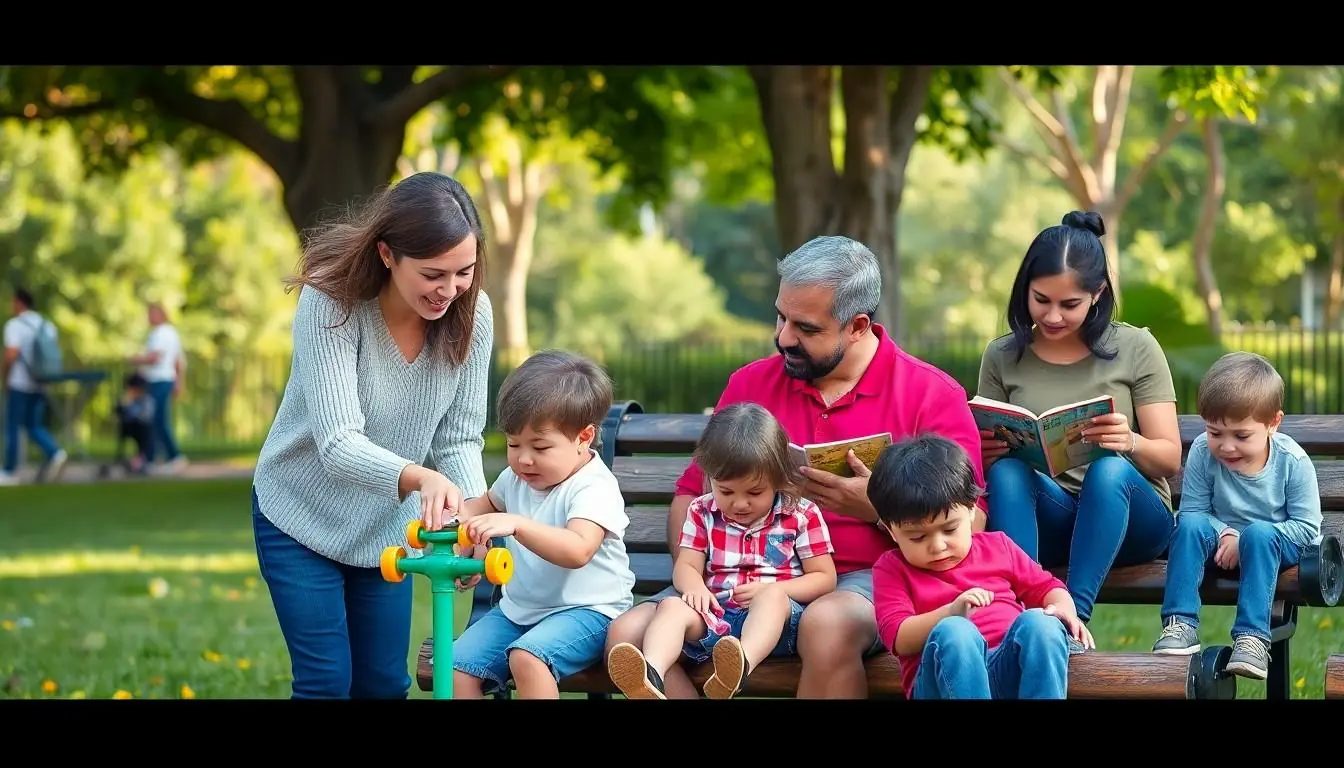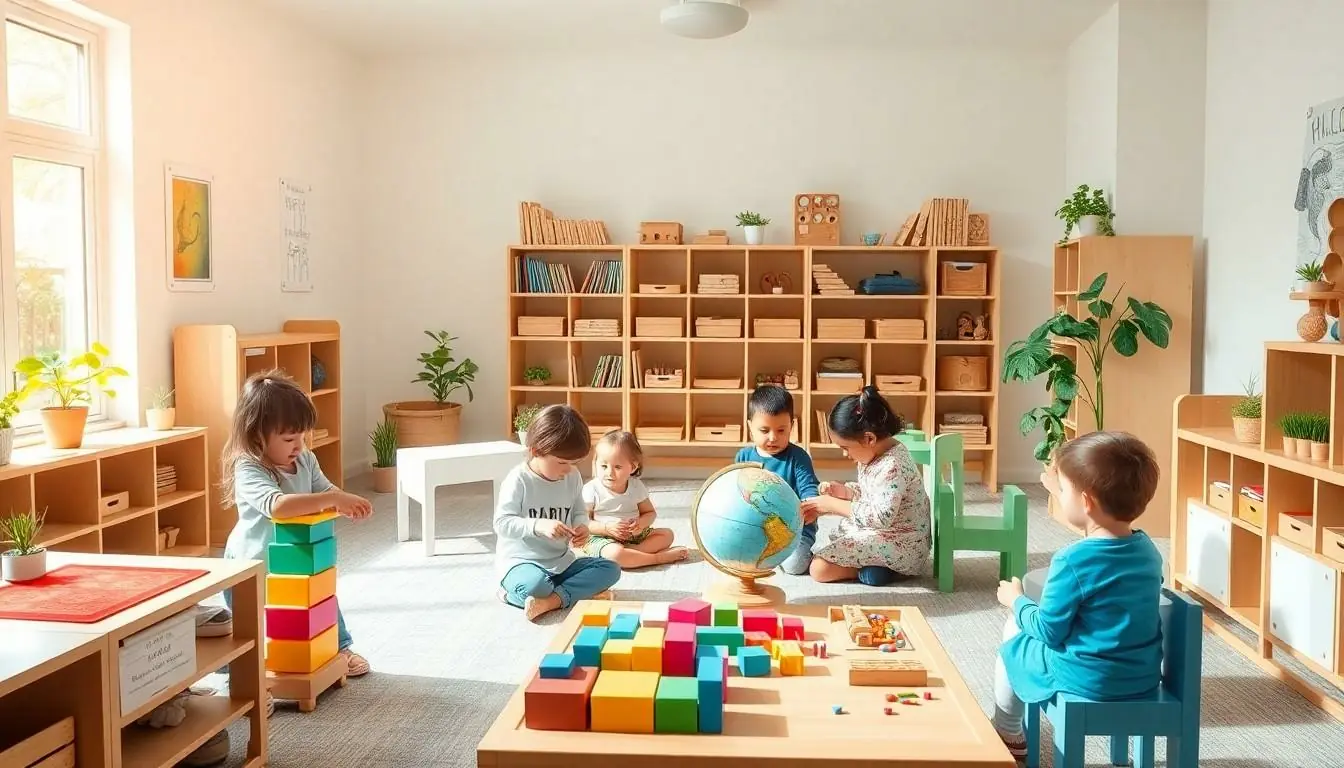Raising kids isn’t exactly rocket science – but sometimes it feels just as complicated! Child rearing practices shape little humans into functioning adults through a mix of guidance nurturing and occasional moments of pure chaos. From the “timeout corner” to positive reinforcement parents worldwide use various techniques to help their children grow and develop.
These parenting methods differ significantly across cultures and generations. While Grandma might have sworn by strict bedtimes and “because I said so” modern parents often embrace gentler approaches focused on emotional intelligence and open communication. Think of child rearing practices as a toolbox filled with different strategies – some families prefer the trusty hammer of structure while others reach for the versatile Swiss Army knife of flexible parenting.
Table of Contents
ToggleUnderstanding Child Rearing Practices
Child rearing practices encompass specific methods parents use to guide children’s development into competent adults. These practices vary across societies based on cultural values social norms economic conditions.
Cultural Influences on Parenting Styles
Different cultures shape distinct parenting approaches through their unique values traditions beliefs. Asian cultures emphasize academic excellence collective harmony respect for elders. Western societies focus on independence individual achievement self-expression. African communities often utilize extended family networks in child raising responsibilities. Latin American cultures prioritize family loyalty emotional closeness strong social bonds.
| Culture | Key Parenting Values |
|---|---|
| Asian | Academic success collective harmony |
| Western | Independence self-reliance |
| African | Extended family involvement |
| Latin | Family bonds emotional connection |
Traditional vs Modern Approaches
Traditional child rearing methods follow structured routines strict discipline clear hierarchies. Parents enforce fixed bedtimes meal schedules homework periods. Modern approaches incorporate developmental psychology research flexible boundaries emotional intelligence. Contemporary parents adapt schedules based on children’s individual needs interests abilities.
| Aspect | Traditional | Modern |
|---|---|---|
| Discipline | Strict rules punishment | Natural consequences discussion |
| Communication | One-way parent to child | Two-way dialogue |
| Schedule | Fixed routines | Flexible adaptable |
| Decision Making | Parent-centered | Child-inclusive |
Key Parenting Styles and Their Impact
Parenting styles significantly influence child development outcomes ranging from academic performance to emotional well-being. Research identifies three primary parenting approaches, each with distinct characteristics and effects on children’s behavior patterns.
Authoritative Parenting
Authoritative parents combine high expectations with emotional support and open communication. These parents set clear boundaries while explaining the reasoning behind rules and consequences. Children raised by authoritative parents demonstrate:
- Higher academic achievement with consistent performance in school
- Strong emotional regulation skills during social interactions
- Enhanced problem-solving abilities in challenging situations
- Increased self-confidence when tackling new tasks
- Better relationships with peers and authority figures
Permissive Parenting
Permissive parents create few rules and rarely enforce consistent boundaries. This parenting style prioritizes freedom over structure in daily routines. Children with permissive parents often exhibit:
- Difficulty following rules in structured environments
- Limited self-control during social interactions
- Challenges with academic discipline and organization
- Increased impulsivity in decision-making situations
- Strong creativity and independence in personal expression
Authoritarian Parenting
- High compliance with authority figures
- Reduced self-expression in social settings
- Lower self-esteem compared to peers
- Increased aggressive behaviors when frustrated
- Limited problem-solving skills in unfamiliar situations
Essential Elements of Positive Child Rearing
Positive child rearing encompasses specific practices that foster healthy development in children. These elements create a foundation for emotional stability social competence.
Setting Healthy Boundaries
Clear boundaries establish a framework for children’s behavior development. Parents communicate specific expectations about bedtime routines screen time limits appropriate behavior in different settings. Consistent enforcement of rules through natural consequences helps children understand accountability. Physical boundaries include designated spaces for homework play areas private zones. Time-based boundaries incorporate structured schedules for daily activities meals family time. These limits provide children with a sense of security predictability while teaching respect for others’ space time.
Building Emotional Connection
Strong emotional bonds develop through responsive attentive interactions with children. Parents demonstrate empathy by acknowledging feelings validating emotions providing comfort during distress. Daily activities like shared meals reading sessions play time create opportunities for meaningful connection. Active listening involves maintaining eye contact showing interest asking open-ended questions about their experiences. Physical affection including hugs gentle touches reassuring gestures strengthens emotional security. Parents express love through words actions consistent presence.
Encouraging Independence
Age-appropriate independence develops through structured opportunities for decision-making problem-solving. Children learn self-reliance by choosing their clothes planning simple meals managing homework schedules. Parents create safe environments for exploration experimentation within defined parameters. Practical skills development includes teaching basic hygiene tasks household responsibilities financial literacy. Independent activities increase gradually from selecting snacks to organizing social activities planning future goals. Support involves guidance rather than intervention allowing children to experience natural outcomes of their choices.
Discipline and Behavior Management
Effective discipline strategies shape children’s behavior through consistent boundaries and positive reinforcement. These approaches promote self-regulation and emotional development while maintaining respectful parent-child relationships.
Age-Appropriate Consequences
Children respond to discipline based on their developmental stage and cognitive abilities. Toddlers (ages 1-3) benefit from brief time-outs lasting 2-3 minutes with immediate feedback. Preschoolers (ages 4-5) understand logical consequences like losing a toy for 30 minutes after misusing it. School-age children (ages 6-12) comprehend privilege removal such as reduced screen time or delayed activities. Teenagers (ages 13-17) respond to natural consequences like earning back trust through demonstrated responsibility. Each consequence matches the child’s comprehension level while maintaining clear behavioral expectations.
Positive Reinforcement Methods
Positive reinforcement strengthens desired behaviors through specific praise incentives and rewards. Children demonstrate 75% more cooperation when parents acknowledge good behavior compared to punishment-based approaches. Effective techniques include:
- Offering specific praise: “You organized your toys without being asked”
- Creating reward charts with achievable daily goals
- Implementing token systems where 5-10 tokens earn privileges
- Providing extra one-on-one time for completing tasks
- Giving additional responsibilities as recognition of maturity
- Using non-food rewards like activity choices or special outings
Studies show children receiving consistent positive reinforcement display increased self-esteem higher academic performance sustained behavioral improvements.
Supporting Child Development
Child development support encompasses strategies that enhance physical mental social emotional growth. These practices create a foundation for lifelong learning success.
Physical and Mental Growth
Physical development requires attention to motor skills nutrition sleep patterns. Children build gross motor abilities through outdoor activities like climbing running jumping. Fine motor skills develop through drawing painting using building blocks. Regular pediatric checkups track growth milestones weight height developmental markers.
Mental growth focuses on cognitive stimulation learning opportunities. Reading sessions enhance vocabulary language processing critical thinking. Problem-solving activities puzzles games strengthen analytical abilities. Educational toys foster spatial awareness mathematical concepts logical reasoning. A balanced schedule alternates structured learning with free play exploration.
Social and Emotional Skills
Social skills emerge through peer interactions guided play family dynamics. Children learn cooperation sharing turn-taking during group activities. Role-playing scenarios teach empathy conflict resolution communication strategies. Team sports clubs extracurricular activities expand social networks relationship building.
Emotional development flourishes in supportive environments with consistent feedback. Parents demonstrate emotion recognition management through daily interactions. Children express feelings safely practice self-regulation coping mechanisms. Positive reinforcement builds confidence self-esteem personal identity. Age-appropriate responsibilities cultivate independence decision-making abilities autonomy.
Conclusion
Child-rearing practices shape the next generation through a delicate balance of discipline nurturing and guidance. Each parenting style offers unique advantages and challenges that impact a child’s development in distinctive ways. The key lies in choosing approaches that align with both family values and the child’s individual needs.
Parents who combine consistent boundaries with emotional support while adapting to their child’s developmental stages create an environment where children can thrive. Whether following traditional methods or modern techniques successful parenting ultimately focuses on fostering well-rounded emotionally stable and socially competent individuals.
The journey of raising children continues to evolve as society changes but the fundamental goal remains constant: nurturing children who are equipped to face life’s challenges with confidence resilience and strong character.




